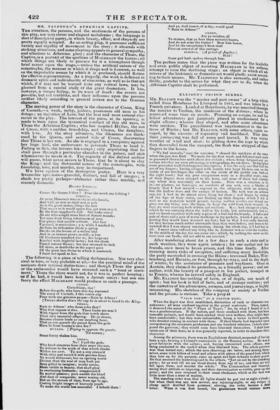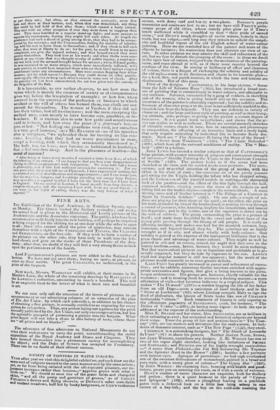ELLISON'S PRISON SCENES.
MR. ELLISON was the " master and part owner" of a brig which sailed from Honduras for Liverpool in 1S03, and was taken by a French privateer. Landed at Bun rdeau x, he was marched through the interior to Verdun, the residence of the detenus ; where he remained some time on parole. Planning an escape, he and his fellow adventurers got purposely placed in confinement for a slight offence ; whence they eloped, and after some adventures were retaken. The punishment was imprisonment in the for- tress of Bitche ; but Mr. ELLISON, with some others, again es. caped, by the exercise of ingenuity and hardihood. This time their journeying was full of sores and travail. It was winter weather of wind and sleet : in gliding down the rope by which they descended from the rampart, the flesh was stripped off their fingers to the bones.
We had scarcely," says the narrator, " cleared the outskirts of the tows when the gun Was fired. We made for the first wood, and followed such road, as presented themselves until about five o'clock ; when, being fatigued and me certain whether we were advancing or retrograding, we sat down. At daylighta scene presented itself that beggared description. I was the or.ly one that had the use of my fingers; having escaped with merely two large blisters, one on the inside of rut fore-finger, the other on the inside of the middle one, both oa the right band ; but my poor companions were in a dreadful state; some of their fingers were stripped to the bone, anti none of them had scarcely any whole skin remaining on their bands. Here was a situation to be in —no plasters, no bandages, no comforts of any sort, wive a bladder of brandy that I had securtd — expmed to the elements, with no covering but the leafless trees and the canopy of heaven. My task was an arduous ore, for I had to do almost every thing for them ; and began by cutting off the laps of their shirts, and binding up their fingers; which I did as well us my materials would permit, having neither needles nor thread nor pins, nor any thing- save the linen, to keep the cold from their wounds: in fart, we were starving both within and without. K— had charge of a ham, which he was carrying down the wall in his teeth, but unfortunately lost it; and we found ourselves with only a piece of a loaf and the brandy. I had a new pair of shoes rind a pair of warm stockings in my pockets, which I put on, ex.
'reefing they would have warmed my feet ; but in that I was sadly deceived, fur they became much colder afterwards than they were before, and were so be- numbed that I was almost unconscious, during the whole (lay, if I had feet at all. I never since suffered any thing like it, however wet or cold the weather. In the middle of the day the sun came out ; which, by melting the snow on the trees over our heads, did nut add to our comfort."
After wandering about fur a few (lass in such a state and in such weather, they were again retaken ; for our author and his friends, once more to break prison, and this time finally. After running many risks of recapture, and suffering many hardships, the party succeeded in crossing the Rhine ; traversed Baden, War- teroburg, and Bavaria, on foot, through by-ways, and in the depth of winter, by the assistance of peasants and wayfarers. Once is Austria, they claimed its protection, as a friendly power; and our author, with the luxury of a passport in his pocket, tramped on to Trieste, whence lie arrived safely in England. Mr. ELLISON has nothing of taste, or of depth, nor much of spirit ; but his book is full of facts, and of strange realities ; and the narrative of his adventures, escapes, and journeyings, is highly interesting. His sketches of the company or society at Verdun and the prisons is curious. Take a peep at
"JACK TARS" IN A FRENCH GAOL.
When the depot was first established, distinction of rank or character was unknown ; all were confined together in the grand souterain. Then, indeed, it deserved the name of the " Place of Tears; " for, by what I heard of it, it was a pandemonium. If the sailors, and those confined with them, had been tameable animals, and would bave studied their own welfare, they might have been comfortable; but they were indomitable, being a terror to thew guards, who dreaded coining in contact with them. If their liberty had depended upon overpowering the seventeen gendarmes and one hundred veterans, (winch com- posed the garrison,) they would soon have liberated themselves. 1 shall here relate one of their feats, as it was generally reported, in order to elucidate their character. Among the prisoners, there was an Englishman detained, suspected of having been a spy, bearing a Colonel's commission in the Russian service. He was a great favourite with the sailors; and, having committed some offence, was being conducted to the cach5t when they liberated him. The whole garrison was then turned out ; which the men observing, ran below, and arming there selves, some with billets of wood and others with pieces of the guard-bed, which they tore up for the purpose, came up again and bade defiance to their guard. He that assumed the leadership said to the others, ":Let us not be the attacking party ; let us wait till we see blood drawn from any of us; and then we will tall upon them, and murder the whole." The Commandant and General, seeing their attitude so imposing, and their determination so visible, gave up the point ; and the men returned to their usual obedience, which at the best was little more than a state of mutiny. The standing order was, that all lights should be put out at eight o'clock ; but when there was any new arrival, any rejoicing-night, or say Vpique (1 cheap spirit distilled from potatoesl stirring the order became a dead letter. When it was first issued, the gendarmes would venture down
bats and shoes at their lantern, sad, when that was demolished, any thing dgt could be laid hold of flew after them ; which caused a hasty retreat. They' me with no other reception if ever they went down to suppress their
rows. They were horrified at a regular stand-up fight ; and were anxious to separate the combatants, fearing they might kill each other. At length the
gendarmes had such a dread of going among them, that they had to be aeconi-
-anied by the veterans ; and the Commandant, finding the inutility of interfer. log, told his men to leave them to themselves ; and, if they chose to kill each other, they were at liberty. to do so: for his part, he would listen to no more complaints, nor give the injured redress; and that henceforward they must govern themselves. They took him at his word ; and when thefts were com- muted, or any crime that was thought worthy of public inquiry, a court-mar- tial was held, and the accuse' brought berme his accuser ; when, if found guilty, be was sentenced to so many stripes, which were immediately inflicted, with such severity as would have surprised those who set their faces against corporal punishmeut under any circumstances. Here were seamen flogging their fellow seamen; and fur what season?—Because they could devise no other punish- ment equally effective to keep each other's vices in some sett of check. After the punishinsnt had been administered, the cat was given into the custody of the Brigadier of the fort.
It is latnentable, as our author observes, to see how soon the virtue which is merely the creature of society or of circumstances gives way before the temptation of example ; or how few, es Len removed from the exercise of the profession or business to which accident or the will of others has formed them, can chalk out any pursuit for themselves. The women at Verdun, if they (lid not lase their virtue, lost all its chariness; and the men, excepting the medical men, seem mostly to have become sots, gamblers, or de- bauchers. It is curious also to note how pride and sensitiveness yield to fortune. and how even the point of a freemaies honour goes at last : " Not (haling our guardians very civil, nor ourselves in a very good humour," sal a Mr. ELLISON on one of his marches after a recapture, "we upbraided them for treating us like CM- viets ; knots tog that they bud no worse punishment in store, except a Letting, with which they occasionally threatened us." The body too, tic hate, teas. become so habituated to hardships, that a bed murders sleep. And lo the pleasures of fruition—the moral of success ! to put them out ; but often, as they entered the susieruin, away flew
" After being at home many months, I received a letter from K—, of which
the fullowiog is an extract. I am happy to find you bear your disappoiutment
(failing to obtain employment) with resignation. We love both had a lesson is philosophy, and of late had sufficient occasion for exercising it. For me own part, ever since you left Me at Plymouth, I have experienced nothing but a continued so es of ism mificatious and disappointments ; and I call assure you, that the anx ibiogers, and haidships attending our escape from Dance, were as uothiLg ei 'opined *.o what I have felt the little time that I have been in England. (hi tie arrival in London. I found myself, horn long absence, a complete sti anger ; and the reception I net with horn toy great friends (as you weie in the habit of calling thrum) was the very reverse of what I expected.'"



























 Previous page
Previous page